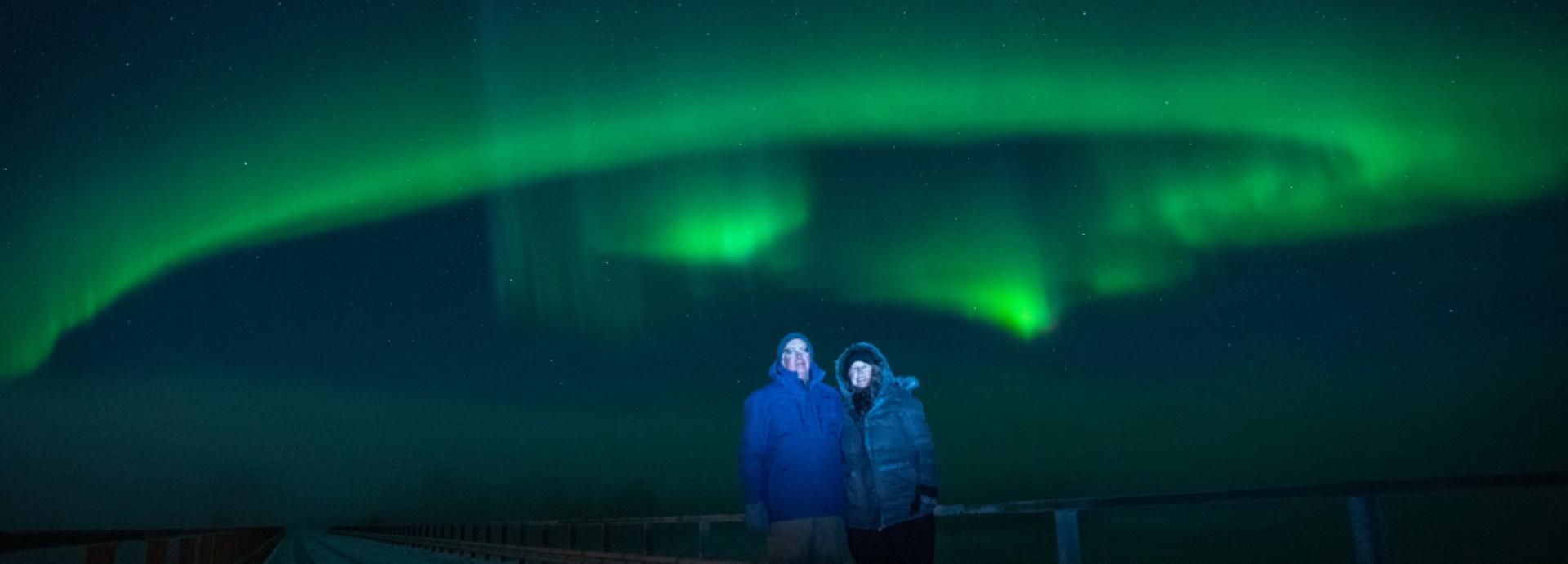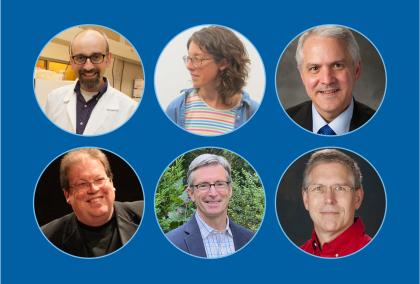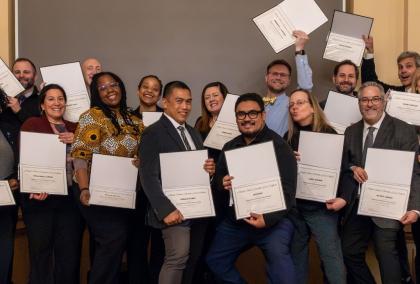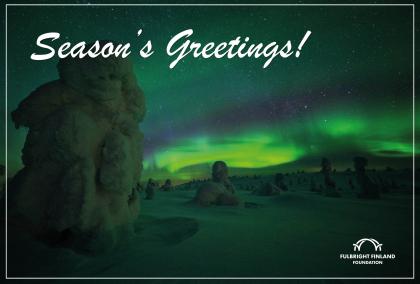

Launching a Finnish Fulbright in the Time of COVID
By David Dorman
Published on June 10, 2020
My wife Melanie and I arrived in Finland at the end of December with great anticipation for my Fulbright award at the University of Eastern Finland (UEF). Arriving in Finland for the first time at the end of 2019 was the culmination of more than a year’s effort. That time was needed to formalize collaborations with my future colleagues at UEF, develop my Fulbright grant proposal, complete paperwork and secure our residence permits, and arrange my sabbatical at North Carolina State University (NCSU). Many other additional large and small steps needed to be completed prior to our beginning this phase of our lives. Melanie had recently transitioned to a new position at a research laboratory here in North Carolina and her new employer allowed her to work remotely in Kuopio until late April. With this timeline in mind, we spent several weekends in January and February visiting Helsinki, Tallinn, and Ivalo. Our first visit to Ivalo in early February coincided both temporally and geographically with the first confirmed cases of COVID-19 in Finland.
Throughout January, February, and March I was able to complete most of my teaching responsibilities at UEF. Fortunately, I was able to create and provide a new graduate level course on systematic review methods in toxicology which was a cornerstone of my Fulbright project. I was also able to launch several smaller research projects that I hoped to complete during my six-month stay in Kuopio. With each passing day we were settling into our new work and home environments. However, the specter of COVID-19 increasingly loomed over our stay in Finland.
By the end of February there were fewer than 10 confirmed COVID-19 cases in Finland so travel within Finland and the Baltics seemed safe. Our first visit to Ivalo was very enjoyable – but it lacked an important element – the cloudy weather at night prevented us from seeing the Northern Lights. We made the decision to revisit the Ivalo area in the hopes of seeing this celestial display. Our second visit ended on March 1st and was associated with several nightly stunning displays of the Northern Lights. Standing on a frozen lake near Nellim at -25C for several hours watching the ribbons of light dance across the sky was well worth the frozen toes and noses. Our last night in Lapland brought us to a bridge near the Russian border where the photo was taken.
With each passing day in March, the growing COVID-19 outbreak in Europe and elsewhere became a common topic of conversation at lunchtime with our UEF colleagues. As you might expect from us being at a medical school, the phrase flattening the curve became a growing part of our vernacular. Travel bans were increasingly appearing in different parts of the world – and my home institution was developing weekly guidance regarding international and domestic travel. For example, in February all university sponsored travel to China was banned. NCSU went further, ultimately restricting travel to any country identified by the U.S. Centers for Disease Control (CDC) as Level 2 or Level 3 for Coronavirus. My home university was ‘requiring’ that NCSU faculty and staff in a COVID-19 Level 3 country return to the United States as soon as possible – colleagues in China were the first to be affected by this guidance. Throughout mid-March we remained hopeful that I would be able to complete my Fulbright as planned. However, that proved not to be the case.
The last week that we spent in Finland went by in a blur. Our week started with a short trip via the Allegro train to St. Petersburg to visit the Hermitage and other sites. During that week the number of COVID-19 cases in Finland and most other Schengen countries rapidly doubled. On March 11th, a planned visit to the Medical University of Lublin in Poland that was to occur through the Fulbright exchange program was cancelled due to COVID-19. The toxicology faculty at UEF met on March 12th to discuss plans for completing the semester online. We left that meeting wondering whether classes held on the 13th might prove to be the last we would hold in person. Very quickly Finland and the other Schengen countries rapidly progressed through each of the higher CDC stages – culminating in their reaching Level 3 by Friday, March 13th. Overnight we received the news regarding the travel ban for travel to the United States. This proved to be the tipping point and we quickly made the decision to return to the United States. We were able to reach several of our UEF colleagues on Saturday morning and we discussed our situation. All of us were in agreement that it was time for Melanie and I to head back to the United States. Several UEF faculty members helped us pack our belongings on Saturday morning and I was lucky to arrange flights back to the United States. Within a few hours we found ourselves at the Kuopio train station and on our way home. This moment was filled with mixed emotions – we felt we were abandoning our newfound Finnish friends and colleagues – and we were saddened by how quickly our plans changed. We left Helsinki on March 14th and arrived in London for an overnight stay.
While getting fish and chips we fortunately learned from a fellow traveler that our flight back to North Carolina was likely to be cancelled. New travel restrictions put in place on the 14th required us to arrive in the United States through a limited number of airports. This requirement had not been reflected in the airline’s website or flight status updates. Nevertheless, we heeded their advice and changed our travel plans. We left London on Sunday morning, arriving in Washington DC for ‘advanced health screening’ – which only amounted to one additional form to be filled out. The need for so called advanced medical screening resulted in thousands of individuals with unknown disease background being funneled into a few concentrated areas for several hours. These everchanging plans seemed poorly thought out from a disease prevention standpoint and reminded me of the famous statement - Nebel des Krieges – the fog of war.
Once we finally arrived back in North Carolina on the 15th we found ourselves challenged to adapt to this abrupt disruption of our lives and plans. We both suffered from anger and depression – acceptance was much slower to occur. Our return to the United States began with a two week ‘quarantine’ – which has since become much more prolonged. I can’t help but compare how our public health officials here in the United States are handling the pandemic to those in Finland. As a health professional I have been disappointed by our nation’s slow response that has put many people at needless risk.
My activities at UEF did not end with my departure – I had several remaining lectures to give. My first week back was spent creating a video recording ‘studio’ to allow me to record and edit lectures at home. This proved unexpectedly challenging since webcams and other electronic recording materials are in short supply. I’ve had a few Zoom calls with my UEF colleagues and students, and we’ve been able to keep in touch via email. I have two online workshops that I hope to complete in the upcoming weeks. I had hoped to return to Finland in June 2020. However, this trip is unlikely to occur given the current situation here in the United States and elsewhere. I remain hopeful that I will be able to return to Kuopio at some future date since there are still a few project related goals that I want to accomplish.
"I’m reminded that the Fulbright program is intended to increase cooperation between different nations. Nations and their citizens can learn from each other – if we are willing to try. I hope that this will ultimately be the long-term lesson from this pandemic."
The past few months have been sobering in many ways. It’s difficult realizing that I have lost control of my life – due to an unseen virus. As a toxicologist involved in risk assessment weighing the risk and benefits is part of what I do professionally. It’s been challenging seeing a seemingly constant stream of misinformation influence critical public health decisions regarding the COVID-19 pandemic. I’m saddened to see my nation pulling back from groups like the World Health Organization at a time when this cooperation is needed most. My time at home has also allowed me to reflect on my all too brief Fulbright experience. I learned a lot during the past few months and I remain grateful to Fulbright Finland, the Saastamoinen Foundation, UEF, and my new colleagues and students for the opportunity. I’m reminded that the Fulbright program is intended to increase cooperation between different nations. Nations and their citizens can learn from each other – if we are willing to try. I hope that this will ultimately be the long-term lesson from this pandemic. Each of us depends in some way on other nations and people. In order for us to thrive we will need to learn to work together. The Fulbright program remains an integral part of this effort.
I hope that everyone can remain safe – and I’m sure all of us look forward to when we can return to a new normal.


